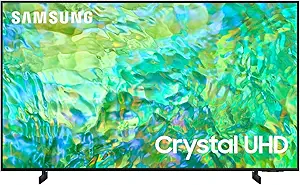As the technology landscape continues to evolve, the battle between television manufacturers intensifies, offering consumers an array of choices when it comes to upgrading their home entertainment systems. Two prominent players in the TV market, Samsung and TCL, have gained widespread recognition for their innovative features and cutting-edge technologies. In this article, we'll delve into a comprehensive comparison between Samsung and TCL TVs, exploring various aspects such as picture quality, smart features, design, and overall value for money.
Key Features Comparison
Picture Quality
Top-Rated Picture Quality Brands
TCL and Samsung televisions are renowned for their exceptional picture quality, distinguished by the technologies they employ. TCL's lineup, notably the 6-Series, incorporates Quantum Dot (QLED) technology and Mini-LED backlighting to enhance color volume and contrast, delivering vivid, detailed images ideal for HDR content. However, some users have reported challenges with motion handling, impacting picture quality during fast-paced scenes. Conversely, Samsung's QLED range utilizes Quantum Dot technology alongside their Quantum Processor, leveraging AI to upscale content to 4K or 8K resolution for sharp, detailed images irrespective of the original content's quality. Samsung TVs also excel in contrast ratios and peak brightness, particularly in well-lit environments, albeit often at a higher price point than TCL models. While both brands offer superior picture quality, Samsung's emphasis on advanced features and technologies gives it a competitive edge in the market.
Design
TCL and Samsung stand out as prominent contenders in the television market, each boasting distinctive design attributes that distinguish them from the competition. TCL TVs are celebrated for their minimalist aesthetics, characterized by sleek profiles and thin bezels that maximize screen real estate for an immersive viewing experience. The simplistic stand design further enhances versatility, facilitating easy placement on various surfaces. However, the predominant use of plastic materials in TCL models may impart a less premium feel compared to alternative constructions. Conversely, Samsung TVs are renowned for their innovative and upscale designs, epitomized by features like ultra-thin bezels and concealed cable systems, as seen in their flagship QLED series. The stands of Samsung televisions often exhibit intricate detailing and stylish flourishes, elevating the overall visual appeal. Utilizing a blend of metal and plastic materials imparts a luxurious feel to Samsung TVs, albeit often at a higher price point than TCL counterparts. While TCL prioritizes affordability and simplicity in design, Samsung leans towards a more premium and aesthetically refined approach, catering to diverse consumer preferences in the realm of television aesthetics.
Sound
Top-Rated Sound Quality Brands
TCL and Samsung televisions are esteemed for their remarkable audio performance, distinguished by unique technologies that cater to different preferences. TCL TVs, for instance, integrate Dolby Atmos technology, delivering immersive three-dimensional soundscapes that envelop viewers in a dynamic auditory experience. Despite this innovation, some users have noted minor distortion issues at higher volume levels. Conversely, Samsung televisions deploy Object Tracking Sound (OTS) technology, leveraging AI algorithms to synchronize sound movements with on-screen action, enhancing immersion, particularly in dynamic scenes. Furthermore, Samsung TVs incorporate built-in subwoofers for deeper bass response, enriching the overall audio experience. Nevertheless, variations in sound quality across models may occur, with lower-tier options potentially lacking the audio finesse found in premium counterparts. While both brands excel in audio performance, Samsung's cutting-edge sound technologies often position it as a preferred choice among discerning consumers seeking immersive viewing experiences.
Quality & Performance
TCL and Samsung stand as prominent figures in the television market, each showcasing distinctive attributes in quality and functionality. TCL, notably with its 6-Series featuring Mini-LED technology, garners acclaim for its exceptional visual performance, characterized by vivid colors and high contrast ratios. However, TCL's sound reproduction may lack the finesse found in other brands, and its smart TV interface, while user-friendly, may not offer the same level of sophistication as competitors'. In contrast, Samsung earns recognition for its outstanding performance and top-tier displays, exemplified by the utilization of Quantum Dot technology in its QLED TVs, ensuring precise color representation and remarkable brightness. Samsung's Tizen OS for smart TVs stands out for its intuitive navigation and vast app ecosystem. Nevertheless, Samsung TVs typically come with a higher price tag compared to TCL models, a factor to consider for budget-conscious consumers. Ultimately, the decision between TCL and Samsung hinges on individual priorities, balancing performance features with affordability.
Smart TV & Connectivity
When it comes to smart TV features and connectivity, TCL and Samsung TVs exhibit variances in their technologies and capabilities. TCL, for instance, predominantly employs the Roku TV platform for its smart interface, renowned for its user-friendly nature and extensive app selection, though some users have noted occasional sluggishness. In terms of connectivity, TCL TVs typically offer three HDMI ports, a USB port, and built-in Wi-Fi and Ethernet. Conversely, Samsung utilizes its proprietary Tizen OS, celebrated for its swift performance and diverse app offerings, supplemented by voice control compatibility with Bixby, Alexa, and Google Assistant, a feature less common in TCL models. Samsung TVs often provide more connectivity options, boasting four HDMI ports, two USB ports, and built-in Wi-Fi and Ethernet, with some models even incorporating Bluetooth functionality. Nonetheless, Samsung TVs tend to carry a higher price tag compared to TCL counterparts, influencing purchasing decisions for certain consumers.
Brand Reputation
TCL and Samsung are both reputable brands in the television industry, each with its own strengths and weaknesses. TCL, a Chinese multinational electronics company, has made a name for itself by offering budget-friendly smart TVs with good picture quality. Their latest models like the TCL 6-Series with mini-LED technology have been praised for their excellent contrast and color accuracy. However, TCL's reputation has been somewhat marred by concerns about the longevity of their products, with some users reporting issues with the TVs' lifespan. On the other hand, Samsung, a South Korean multinational conglomerate, is renowned globally for its high-quality electronics, including televisions. Samsung's reputation in the TV market is bolstered by their innovative technologies, such as QLED (Quantum Dot LED) and MicroLED, which deliver superior picture quality. Their latest models, like the Samsung QN90A Neo QLED, have received rave reviews for their exceptional brightness, color accuracy, and deep blacks. However, Samsung TVs are generally more expensive than TCL TVs, which may deter budget-conscious consumers. Despite the price difference, Samsung's reputation for durability and after-sales service is generally better than TCL's, making it a preferred choice for many consumers.
Brightness
TCL and Samsung stand as prominent contenders in the television industry, each with distinctive attributes regarding brightness. TCL, notably in its 6-Series lineup, integrates QLED technology with quantum dot enhancement film (QDEF), facilitating heightened peak brightness compared to conventional LED TVs. This feature renders TCL TVs well-suited for well-lit environments. However, users have cited occasional brightness inconsistencies across the screen, particularly noticeable during darker scenes. Conversely, Samsung televisions, particularly premium variants like the Q90T series, harness their proprietary Quantum Dot technology alongside a direct full array backlight to achieve superior brightness and contrast ratios. Samsung's TVs further benefit from an 'Ultra Viewing Angle' layer, ensuring uniform light distribution across the screen and mitigating brightness irregularities. Despite Samsung's advancements, its TVs typically command a higher price point compared to TCL models. While both brands excel in brightness performance, Samsung's technological sophistication grants it a slight advantage in this regard.
Smart Features
TCL and Samsung televisions both provide an array of intelligent functionalities aimed at enriching the user experience. TCL utilizes the Roku TV platform for its smart features, offering an extensive selection of apps, including popular streaming services such as Netflix, Hulu, and Amazon Prime Video. Moreover, TCL smart TVs support voice control through integration with Amazon Alexa and Google Assistant. However, TCL's smart capabilities may not be as cutting-edge as those of some competitors, and while the interface is easy to navigate, it may lack the sleekness desired by certain users. Conversely, Samsung TVs operate on the Tizen OS for their smart features, boasting a user-friendly interface and a diverse app catalog. Notably, Samsung stands out for its SmartThings integration, enabling seamless connectivity with various smart home devices. Furthermore, Samsung TVs feature advanced voice control options like Bixby, with newer models also supporting Google Assistant and Amazon Alexa. Nonetheless, the Tizen OS has faced criticism for its relatively limited app selection compared to other platforms. In summary, while Samsung TVs offer more advanced smart capabilities, TCL TVs provide solid and user-friendly features at a typically more affordable price point.
Remote Control
TCL and Samsung televisions both provide sophisticated remote control options, yet they diverge significantly in their design and functionality. TCL's recent models are accompanied by the Roku TV remote, celebrated for its straightforwardness and user-friendly nature. Featuring a sleek design with just 20 buttons, it offers simplicity, particularly appealing to less tech-savvy users. Additionally, the Roku TV remote integrates voice control capabilities, enabling users to execute various commands effortlessly. However, it lacks certain advanced functionalities like backlighting and universal control of external devices. In contrast, Samsung's latest TVs are paired with the Smart Remote, also known as the One Remote, distinguished by its sleek and modern appearance. With a minimalist button layout, it prioritizes ease of use. Notably, the One Remote boasts universal control capabilities, allowing users to manage both the television and connected devices, streamlining the user experience by eliminating the need for multiple remotes. Despite its innovative features, some users have noted that the Smart Remote's touchpad can be overly sensitive, posing challenges during navigation. While both TCL and Samsung offer competitive remote control options, Samsung's One Remote stands out due to its universal control feature, providing users with enhanced convenience and efficiency.
Related Video
Conclusion
Choosing between Samsung and TCL ultimately boils down to individual preferences, budget constraints, and the desired features. Samsung excels in high-end models, offering top-tier picture quality and premium designs, but at a higher cost. TCL, on the other hand, appeals to the budget-conscious consumer by providing solid performance, commendable picture quality, and user-friendly interfaces at a more affordable price. Consider your priorities, compare specific models, and make an informed decision based on your unique preferences and budget.



















